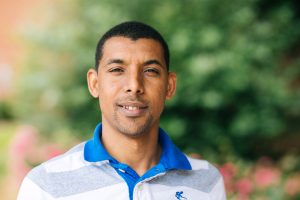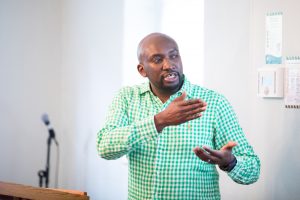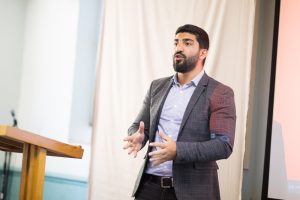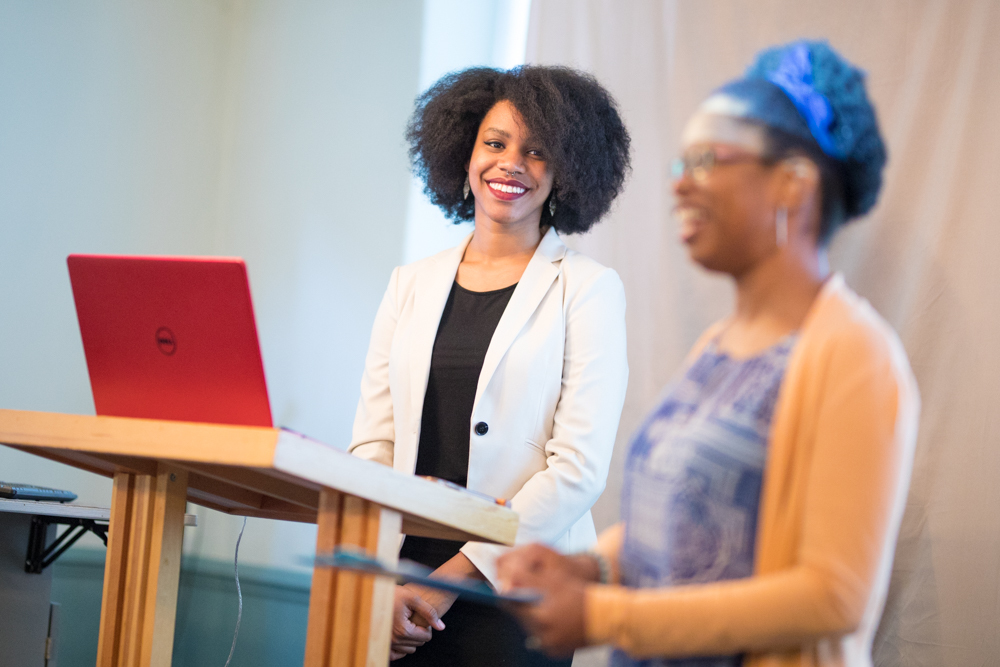Second-year master’s degree candidates in the conflict transformation and restorative justice programs at Eastern Mennonite University’s Center for Justice and Peacebuilding (CJP) recently completed practicums in restorative justice, transforming extremism, identity formation and more.
In April and May the following candidates presented about their recent practicum sites and research interests:
Eunkyung Ahn: Bridging the East and West in restorative justice movements in educational settings

Ahn, a teacher and restorative justice (RJ) practitioner from South Korea, was an intern of Schooltalk’s Restorative D.C. initiative in Washington D.C. While there, she broadened her knowledge about RJ movements in DC and shared her experiences with educators, RJ specialists and social workers. Two additional activities coincided with her internship. First she brought 18 school teachers from diverse regions of South Korea to EMU for a five-day training on embodied and anti-oppressive pedagogy, which she co-coordinated and co-facilitated. Ahn also contributed to a chapter for the book Restorative Justice in Educational Settings and Policies: Bridging the East and West. In her qualitative case study, Ahn demonstrated the effectiveness of school-based RJ practices on youth empowerment and the valuing of student voices, by sharing a story of Shin-Heung Middle School. Read more about her work.
Samira Abou Alfa: Peacebuilding and transforming violent extremism fellowship at Equal Access International
Equal Access International (EAI) is a peacebuilding and development INGO in Washington D.C. Currently operating in 15 countries, it helps communities drive sustainable and transformative change through a participatory media, technology and outreach model. As an EAI Fellow, Alfa was dedicated to fostering a culture of learning and critical peacebuilding practice. She developed educational materials, including a tech-camp training manual and a hackathon organizer and trainer manual. She conducted a literature review on the M&E frameworks and tools in peacebuilding and best practices to support the development of a structure of design, monitoring, evaluation, and learning at EAI. She also provided support to the business development team and the management. In addition to highlighting the two manuals, her presentation included observations about and recommendations for development and peacebuilding organizations focused on reflective practice, learning organizational cultures, and leadership.
Talibah Aquil: Ghana, Remember Me…
Aquil’s arts-based independent research project centered on exploring healthy and holistic approaches to reimagining the “Identity Formation” of African Americans and people of the diaspora who are descendants of slavery. She journeyed to Ghana for the “Year of Return” and documented the lived experiences of people of the diaspora who decided to move to Ghana and how that transition and connection to their history has shaped how they see themselves now. Aquil also documented her own personal journey of self-discovery and healing during her time in Ghana. Her capstone was shared through the lens of poetry, music, dance and video.
Bouela Lehbib Breica

Breica did his practicum as a research intern at the Middle East Institute in Washington D.C. He helped to conduct research on the Middle East and attended different events reflecting problems happening in the region as well as available peacebuilding interventions. During his practicum presentation, he provided reflections on how think tanks work in Washington, their contributions, and their impact on peace and justice, as well as on the challenges a peacebuilder might face working in such environment.
Ilaria Buonriposi: From Superwomen to Women: Cultivating a trauma-informed, resilience-building, and healing-oriented cultural shift for the Comboni Missionary Sisters
For more than half of her life, Buonriposi has been a member of the Comboni Missionary Sisters (CMS), an international Catholic intentional community of women. Present in 35 countries, it ministers to and serves those who are excluded and considered insignificant. Although most of the Sisters live for years in highly traumagenic environments, CMS does not have an established culture for addressing the traumatic stress that members experience. During her practicum, Buonriposi explored how other religious communities address trauma, build resilience and support the healing of their members, not only of the communities they work within. She has also taken advantage of her insider position to design and propose tools to foster the desired cultural shift. She hopes to make this her lifelong commitment.
Filip Cvetanovski: Fostering peacebuilding and resolving conflict through facilitating high level dialogue
Grassroots peacebuilding has shown impressive results over the years, whereas top-down peacebuilding approaches are lagging behind. Is it possible to apply the same principles of connection and relationships between governing officials by using the tools and methods that the Center for Justice and Peacebuilding rediscovered, innovated and shared with the world?

Felix Kioko: How do Catholics spell peace-building?
Kioko interned at the Baltimore, Maryland, headquarters of Catholic Relief Services (CRS), a non-profit organization that has been in the field of peacebuilding for the past 75 years in 100 countries globally, strengthening communities and responding to disaster. He worked with the Africa Justice and Peace-building Working Group. Kioko’s role was under the Monitoring Evaluation Accountability and Learning peacebuilding methodology. He focused on the CRS social cohesion peacebuilding approach – People to People programs – implemented in Asia, Africa and Europe, with the aim of documenting best practices, challenges and the lessons learned. He shared about his findings, takeaways, learnings and experience at CRS, and about dwelling in Baltimore city.
Kamran Mamedovi: Organizing with people on the ground: Building relations to build power

At the grass-roots organization Organizing Neighborhood Equity in Washington D.C. (ONE DC), Mamedovi participated in organizing and building power within marginalized communities for a more equitable and dignifying living conditions. Working closely with poor and working-class communities of color, he conducted ethnographic interviews on the history of the Black struggle and the methods of organizing to oppose the oppressive and discriminatory structures and culture to build a more inclusive society. Mamedovi aims to return to Georgia and organize ethnic Borchali Turks to restore justice and build positive peace, using some of the organizing strategies and techniques of ONE DC.
Anna Messer: Supporting refugees in their search for better jobs in the Shenandoah Valley
During her practicum with Church World Service, Messer met over 30 refugees and families from the Democratic Republic of Congo, Ukraine, Pakistan, Afghanistan, Rwanda, Burundi and Uganda. Along with other volunteers, interns and staff, she offered support to refugees in their first days, weeks and months in the United States. They met for English language class, cultural orientation, bus orientation, health appointments and job interviews. Messer also explored opportunities for longer-term support, and was specifically concerned with how immigrants in the Valley with professional work experience in their home countries might continue their careers here. In addition to other activities, Messer met with families to learn about their employment and educational experiences and goals, and walked alongside individuals working in the local poultry industry who are seeking to secure new jobs in their former career fields.
Caitlin Morneau
While serving as the director of restorative justice at Catholic Mobilizing Network, Morneau formed an RJ steering committee. Comprised of practitioners utilizing restorative practices in Catholic contexts, the group sought to clarify core values and principles from a Catholic perspective, offer input in educational and programmatic efforts, and act as a central body in establishing an intentional network for Catholic RJ activities. Morneau deepened relationships with key collaborators, exercised process design and facilitation skills, and gained insights to inform the organization’s programmatic activities and outward communications.
Katrina Poplett: A(nother) day in mid-America: Micro RJ in macro systems
Kansas City, Missouri, is often passed over in nation-wide conversations around RJ and gun violence. However, in 2018, Kansas City was ranked as the 13th most dangerous city in America, as measured by violent crime. It also has one of the premier organizations of RJ, the Center for Conflict Resolution, where Poplett completed her practicum. The center reaches into communities, prisons and schools, creating conversations around societal problems facing the city and encouraging people to address problems through non-violence and RJ processes. Poplett worked within two school districts, teaching K-8th grade students conflict resolution skills and facilitating mediations with students in conflict. Her capstone covered some of the key insights she found while doing RJ work in school districts and a city affected by oppressive systems and about how RJ is offering both a way forward through the violence as well as an alternative future.
Ben Rush: Working with faith
Rush worked with Faith in Action, a local organization dealing with social justice issues in Harrisonburg and Rockingham County, conducting interviews and research for the organization. In his presentation, he also reflected on what it means for him to put his own faith into action for peace and justice.
Bahman Shahi: Strategic planning in Central and South Asia
Shahi worked with the associate vice president and head of strategy and program quality at Search for Common Ground. As a Strategic Planning Fellow, he supported the development of a ten-year strategic plan in Central and South Asia. His main responsibilities included conflict analysis, donor and partner mapping and operational assessment in this region. This exercise assumed that the conflict in this region is transnational, and so they needed to develop strategies based on the borders of the conflict and not nation-states. It is a long-term project which includes desk research, field missions, in-person meetings and participatory planning workshops.
Benton Stull: Sacred Stories and Healing Communities: United Methodist Church responses to mass incarceration in western Ohio
The West Ohio Conference of the United Methodist Church covers about 1,000 church congregations in the western half of the state. It provides education and training for interested congregations to become Healing Communities, which aim to better support the people and communities most impacted by mass incarceration. As a part of his practicum, Stull provided introductory RJ training to groups within the conference. He spent the larger part of his practicum with Grace United Methodist Church of Dayton, where he helped to lead their Sacred Stories program, which uses a circle process to facilitate participatory biblical storytelling and group discussion for people held at the Montgomery County Jail in Dayton.
Mikayla Waters-Crittenton: The expansion of everyday RJ at EMU
Waters-Crittenton worked with EMU’s Office of Student Life as an RJ educator, facilitator and trainer. She helped provide RJ education and facilitation for the EMU residential (primarily undergraduate) community. Along with a team of staff and students, she hosted a campus-wide training on restorative justice in collaboration with the Zehr Institute. She also began the implementation of preventative RJ processes as well as the exploration of RJ options for sexual- and gender-based misconduct.
